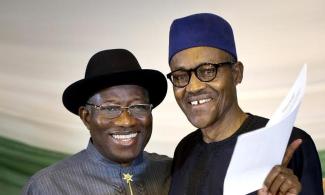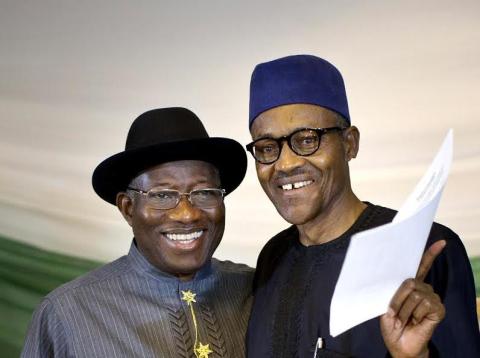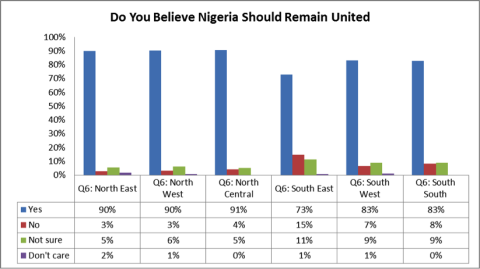
It has been interesting to observe the post-election analyses of the 2015 polls. The PDP has been in crisis mode, with claims and counterclaims that Goodluck Jonathan’s loss was due to failed strategies by either the party’s national executives or the presidential strategy committee. On the other hand, the APC, quite understandably, has been in ebullient form, claiming that their party’s comprehensive victory at the polls was as a result of their masterful strategies. The insights that we generated from both surveys indicate that the PDP is being too harsh on itself, and the APC should be cautious in its assessment of its hold on the Nigerian political system.

On Feb 14th and March 23rd, 2015, we published two articles that reported the results of a comprehensive polling survey of the 2015 elections. The survey’s comprehensive 42 item questionnaire explored the impact of demographic, cultural, ethnic and religious themes on political choice in Nigeria.
Our aims in conducting these surveys were two-fold – firstly, we wanted to demonstrate that political discourse in Nigeria was subject to the same drivers and dynamics as in any other polity, and that there was nothing inherently inscrutable about the political preferences of Nigerians. Secondly, we wanted to explore the role that objective activities such as political polling and surveys could play, not only in predicting the outcomes of elections but also in enabling political actors and administrators to have reliable means of feeling the pulse of their constituents. Politicians derail, when once in office, they get enveloped in a cocoon of negligent indifference that is erected by sycophants and overzealous security agents. Such cocoons can prevent them from fully comprehending what the major concerns of their constituents are, and how their policies are impacting those interests. We believe that both aims were met. On aggregate, both of the surveys we published conclusively determined that Buhari and the APC would sweep both the presidential and national assembly elections.
Why Buhari Won – A Retrospective Analysis
It has been interesting to observe the post-election analyses of the 2015 polls. The PDP has been in crisis mode, with claims and counterclaims that Goodluck Jonathan’s loss was due to failed strategies by either the party’s national executives or the presidential strategy committee. On the other hand, the APC, quite understandably, has been in ebullient form, claiming that their party’s comprehensive victory at the polls was as a result of their masterful strategies. The insights that we generated from both surveys indicate that the PDP is being too harsh on itself, and the APC should be cautious in its assessment of its hold on the Nigerian political system.
Ahead of the elections, we provided clear indications for why Goodluck Jonathan would lose the 2015 polls and why power was going to shift at the Presidential level for the first time in Nigeria’s political history. The 2015 polls were not won or lost because of grand strategies and strong political party platforms and programs by either party. The 2015 Presidential election was simply a referendum on the PDP’s unique brand of scorched earth corruption. The APC and its candidates, particularly those who contested for national assembly seats (for which elections were simultaneously held at the same time as the presidential elections), were all beneficiaries of the Buhari phenomenon. By understanding the basis of their victory, the APC will better understand the tenuous nature of the mandate that Nigerians have handed to the party, and the significant expectations that come along with that mandate.
Although corruption only ranked 5th, on the list of voter priorities, it (corruption) was blamed for the failure of the PDP government to obtain any credible headway in addressing the 4 issues that Nigerians ranked ahead of it in their list of major priorities and concerns: i.e., the security situation / Boko Haram crisis, ensuring economic growth, creating jobs and easing unemployment and resolving the chronic issues in the power sector (see Figure 1).

What Nigerians Want
Broadly speaking, our analysis indicates that Nigerians expect four things from the Buhari government. Firstly, they expect so see a significant improvement in the security situation in Nigeria. The Boko Haram crisis is just one of many security challenges that Nigeria has. There is a clear expectation that the general security of lives and property be significantly improved.
Secondly, Nigerians expect to see vast improvement in their economic situation. They expect to see real economic gains that transform into actual changes in their livelihood. Nigerians also expect that these macroeconomic gains will transform into jobs and employment for the teeming populations of unemployed people.
Thirdly, Nigerians seek greater accountability from their leaders. Corruption is merely one facet of the accountability issue. Nigerians expect that the impunity with which elected and appointed leaders violate the law and trample on the constitution will cease. Nigerians also expect to see significant positive changes that will reverse the rampant abuse of the legal system, the failure of the legislature to live up to its responsibilities, the ineptitude that has come to characterize the civil service and the callous insensitivity of law enforcement. Nigerians have come to view these ills as parts of the hydra headed monster called corruption. The expectation of Nigerians is for comprehensive systemic change – not one that is just focused on the personal integrity of the president. The implications are that Buhari’s saintly personae will not be sufficient for Nigerians. While Buhari’s personal incorruptibility is not in question – that was what got him and the APC elected In the first place - Nigerians expect that he will be able to translate that same ethos for incorruptibility and accountability to the government that he leads. A saintly Buhari and a corrupt APC-led National Assembly, inept Ministers, compromised judiciary; unmotivated law enforcement agencies and lackadaisical civil service portend a political and moral contradiction that will be unacceptable to Nigerians.
Finally, Nigerians expect to see significant improvement in sectors that impact their quality of life and enhance productivity. These include Housing, Transportation, Healthcare and Telecommunications, where some gains have been made in the last few decades. If an acronym is to be coined for these 4 priority areas of concern for Nigerians, it would be SEAL – Security, Economic growth, Accountability and Living standards.
The Burden of Great Expectations
As we earlier indicated, our polling data indicated that Nigerians had not voted for the APC on the strength of its programs, but on the anti-corruption bona fides of Mr. Buhari. However, the Nigerian people expect that Mr. Buhari will not only tame corruption, but will lead his party, the APC, to deliver gains to Nigerians across a broad range of sectors.
Buhari and the APC have high expectations to meet. The areas of top priority are visible areas where success or failure cannot be hidden behind arcane and unverifiable numbers. Nigerians want to see economic growth – in tangible areas that impact their personal economies. They are not interested in merely hearing about rebased economic numbers and macroeconomic fairy tales that do not translate to job growth or increased wages. Nigerians will not judge improvements in the power sector by stratospheric discussions about generating capacity, expansion of transmission assets and other such generalities. Their interest is in having their homes and businesses powered. The Nigerian people expect that Mr. Buhari will be able to harness his tremendous goodwill and political capital towards ensuring that his party, the APC, delivers at every level of government. They voted the APC into power not because they thought that the party was fundamentally different from the PDP, but because they believed that Mr. Buhari would somehow be able to bring his personal brand of Spartan puritanical discipline to the juvenile excesses that characterize Nigeria’s political system. By providing Mr. Buhari with an APC led National Assembly, and a majority of state executives and assemblies, Nigerians have given him all the tools that are needed to succeed.
What Mr. Buhari Can Rely On
Although Mr. Buhari inherits a Nation with a battered economy, that is fractured along deep religious and ethnic fault lines (see Figure 2), he can take solace in the fact that he will also be presiding over a country whose citizens overwhelmingly favor the continuation of the Nigerian union. While only about 20% of respondents believe that Nigeria is united, by an overwhelming majority of about 85%, Nigerians from across all six (6) geopolitical zones favored continued national unity over fragmentation and breakup (see Figure 3).


Conclusions
The 2015 elections were perhaps the most contentious in recent political history. While the process had some negative aspects, it was also not without its high points. On a positive note, polling played a larger role in this electoral cycle than in previous ones. While the veracity and validity of the polling methods and surveys that were on offer can be questioned, there is no doubt that the incorporation of analytical methods into the political process forced some deeper introspection amongst candidates, the political parties and their supporters, than was customary.
Despite the threats of violence and the uncertainties that pervaded the entire process, the Nigerian electorate was resolute in its commitment to participatory democracy. Those patriots who braved the elements to stand in line from dawn to dusk, sometimes at great risk to their own safety, should be saluted for their courage and their perseverance. The only appropriate payback for the dogged determination to engender a new socio-economic order demonstrated by Nigerians at the polls will be for the APC to deliver on its promise of true change that will usher Nigeria to new heights of productivity and development.
It must be noted that at 43.65%, the turnout for the 2015 Presidential elections was the lowest since 1979. The average turnout in the previous four (4) Presidential elections since 1999 has been about 58%. The reasons for this low voter turnout are unclear. There have been suggestions that many voters might have registered in places that they were not able to access on Election Day. For instance, those who registered near their places of work would not have been able to get to their voting stations because of restrictions to movement. While this is a plausible argument, it will be surprising if it was the major cause of low voter turnout. After all in the 2011 electoral cycle, elections were similarly restricted to the venues where people registered to vote, and so this was not a new requirement.
One must either believe that despite the high emotional intensity generated by the electioneering campaign, there was still significant ambivalence towards both candidates, or that there was a pervasive fear of violence that kept people away from the polls. Another explanation might be that the turnout in this electoral cycle is actually more reflective of the real level of voter participation in Nigerian elections, and that previous elections were characterized by fraud in a way that was not possible in the 2015 polls due to the use of the personal voter card (PVC) readers – which set an upper bound on voter counts, limiting the ability for wholesale voter fraud by restricting rigging to an upper bound constrained by the number of people who were actually accredited to vote on election day, and not on the entire population of registered voters.
The maturity which many of those that lost displayed in quickly accepting the outcomes of the electoral process should be saluted. We join those who have been complimentary of the action that outgoing President Goodluck Jonathan took in conceding defeat and making a concession call to Mr. Buhari. It is the first time that a President is losing office in Nigeria’s political history. It is commendable, that the precedence which will be left for future Presidents who find themselves on the losing end of elections to emulate, is that given by Dr Goodluck Jonathan – accepting loss without rancor and acrimony.
We urge political actors to embrace polling as a means of keeping their pulse on the electorate. We also encourage the electorate and civil society groups to use polling as a means of communicating their views to their political leaders. Our work indicates that even exclusive internet based polling can be an effective means of gaining valid insights about the political process, as long as certain fundamental principles are adhered to. We confirmed that concerns about the demographic exclusivity of online respondents as a reason to discount e-based polls is premised on a false notion that the internet connected respondent belongs to a demographic that does not reflect the norm. Our demographic data conclusively shows that online respondents come from a wide variety of income brackets, including a cache of unemployed persons that tracks the national average. About 16% of our respondents earn less than the minimum wage, and 42% self-identified as either being self-unemployed (31.5%) or unemployed (11%). These are hardly numbers that are reflective of the privileged elite that are presumed to make up most of the respondents of online polls.
We caution aspiring pollsters that in order to obtain accurate predictions from internet derived polling data, they will need to factor in region based weighting of polling results, and work to ensure that their respondents are recruited from a variety of sources that will guarantee they have a truly random sample. Regional and religious differences are a reality in Nigeria, and for validity, any e-poll should actively seek to obtain information that will enable the regional origins and religious predilections of the respondents to be factored into the survey analysis (see Figure 2).
Disclosure:
The 2015 National Electoral Poll was not commissioned by any political party, or vested organizations and/or individuals in the Nigerian political process. Dr Malcolm Fabiyi holds a BSc (First class) degree in Chemical Engineering from the University of Lagos, an MBA from the University of Chicago and a PhD in Chemical Engineering from Cambridge University. Dr Adeleke Otunuga holds Bachelors and Masters Degrees from the University of Lagos, and a Doctor of Management (Organizational Leadership) Degree from the University of Phoenix. Any inquiries regarding the survey should be directed to [email protected].